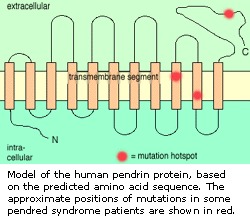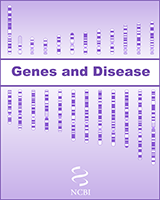NCBI Bookshelf. A service of the National Library of Medicine, National Institutes of Health.
National Center for Biotechnology Information (US). Genes and Disease [Internet]. Bethesda (MD): National Center for Biotechnology Information (US); 1998-.

Pendred syndrome is an inherited disorder that accounts for as much as 10% of hereditary deafness. Patients usually also suffer from thyroid goiter. The recent discovery of the gene for Pendred syndrome illuminates a disorder that has confounded scientists for more than a century.
In December of 1997, scientists at NIH's National Human Genome Research Institute used the physical map of human chromosome 7 to help identify an altered gene, PDS, thought to cause pendred syndrome. The normal gene makes a protein, called pendrin, that is found at significant levels only in the thyroid and is closely related to a number of sulfate transporters. When the gene for this protein is mutated, the person carrying it will exhibit the symptoms of Pendred syndrome.
Because goiter is not always found in Pendred syndrome patients, it is possible that a defective pendrin gene will turn out to be responsible for some cases of deafness that had not previously been attributed to this disorder. The discovery of pendrin should also stimulate new angles of research into thyroid physiology and the role of altered sulfur transport in human disease.
- Genome view see gene locations
- Entrez Gene collection of gene-related information
- BLink related sequences in different organisms
- Research articles online full text
- Books online books section
- OMIM catalog of human genes and disorders
- GeneReviews a medical genetics resource
- Research News from the National Human Genome Research Institute, NIH
- GeneLocus Links
- Pendred syndrome - Genes and DiseasePendred syndrome - Genes and Disease
Your browsing activity is empty.
Activity recording is turned off.
See more...
